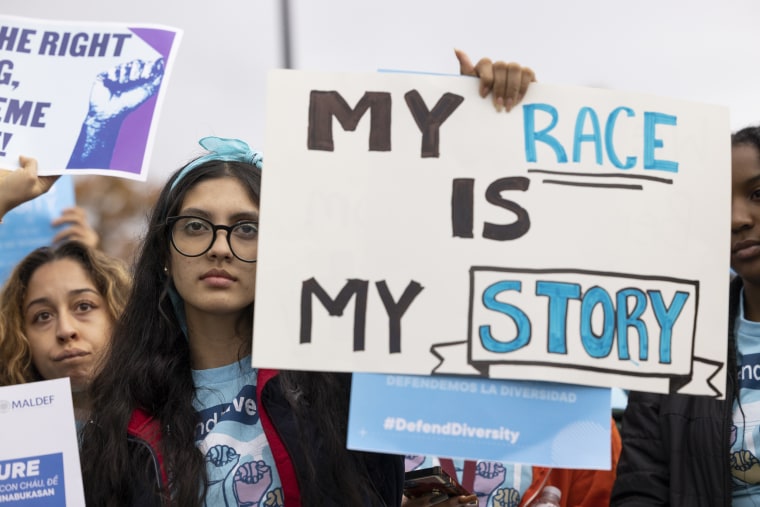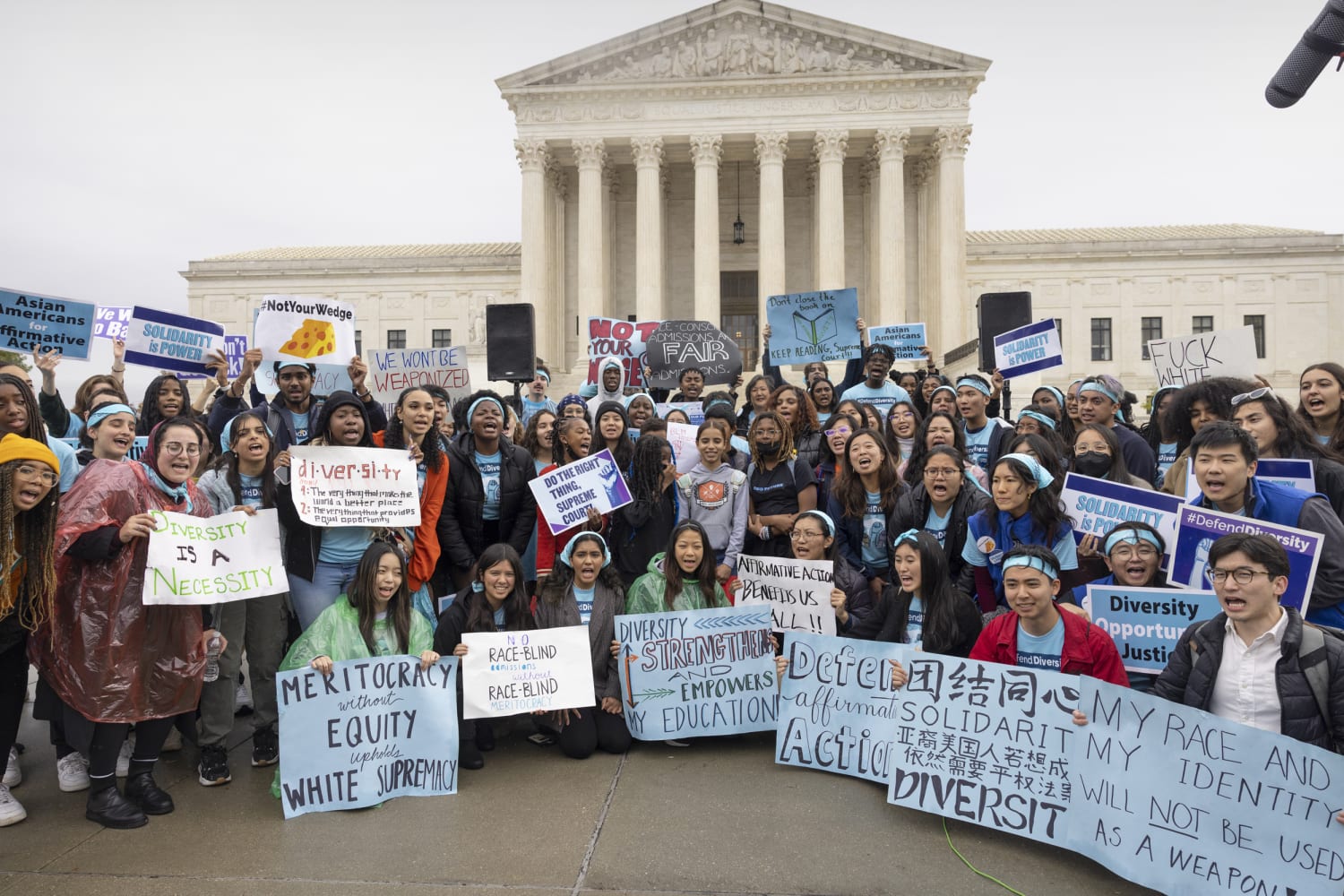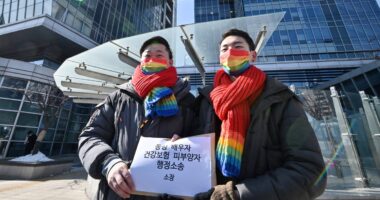Historically Black colleges and universities are just as prestigious as Ivy League schools, and they’re diverse. That is why, leaders say, HBCUs and other minority-serving institutions will be even more important to students of color should the Supreme Court end affirmative action in college admissions.
As conservative Supreme Court justices seem poised to end the explicit consideration of race in college admissions, HBCU leaders say doing away with race-conscious admissions would have a dire impact on racial equity in the country. They believe it would create “racially isolated” colleges and universities, making HBCUs and other minority-serving institutions, or MSIs, among the only institutions where Black and Latino students would feel supported and safe.
“Our missions are concerned with racial justice and racial equity. So the overturn of race-conscious admissions would be a serious blow to the mission of HBCUs and all minority-serving institutions,” said Danielle R. Holley, a law professor and the dean of Howard University School of Law.
“I hope that no one will assume that HBCUs and MSIs will be able to absorb the number of students who may feel they are no longer welcome at racially isolated, predominantly white universities.”
She said overturning race-conscious admissions would even “decrease the amount of racially diverse professors for universities across the country,” adding that “many professors are educated at Harvard” and that the loss of race-conscious admissions would likely “decrease the amount of racial diversity in academia in a very significant way.”

The Supreme Court is hearing cases that challenge affirmative action policies at Harvard University and the University of North Carolina. The group Students for Fair Admissions Inc., led by the conservative activist Ed Blum, accuses the universities of discriminating against Asian Americans and favoring Black and Latino students. Some Asian Americans have criticized the cases, saying Blum is simply using them in a thinly veiled attempt to upend affirmative action and sow racial discord.
Organizations and institutions across the country have condemned the cases in amicus briefs and urged the Supreme Court not to end the practice, which experts say improves racial diversity in higher education and helps make amends for historical racial discrimination. Holley spearheaded an amicus brief in support of UNC and Harvard from several HBCU leaders and the National Association for Equal Opportunity in Higher Education.
“One of the absolutely false notions of these cases is that somehow meritocracy and racial inclusivity do not go together,” Holley said. “HBCUs and MSIs are examples — and will become even more important examples — of the fact that you can have high-achieving academic institutions that are also racially inclusive and diverse.”
She added that HBCUs shouldn’t be seen simply as alternatives to predominantly white institutions.
Referring to Students for Fair Admissions, Holley said, “It is a very poor argument by SFFA, and anyone else who promotes it, the idea that HBCUs would be ‘fallback’ institutions or institutions where Black students are better matched than they are at schools like Harvard and UNC. HBCUs are schools of academic excellence and are selective.”
There are more than 100 HBCUs in the U.S., according to the National Center for Education Statistics. Most HBCUs were founded before 1964 as higher education institutions for Black people who were either shut out of most predominantly white institutions or who faced severe racial discrimination and inequality at the few schools that did accept them. Although HBCUs are predominantly Black institutions, non-Black students made up 24% of HBCU enrollment in 2020, according to the NCES.
That diversity is important to consider amid claims that HBCUs make race-conscious admissions unnecessary, said Marie Bigham, the founder and executive director of the race-conscious admissions advocacy group Admissions Community Cultivating Equity & Peace Today.
“One of the amicus briefs on the side of SFFA pointed to HBCUs as evidence that you don’t need diversity for excellence,” Bigham said. “The fact that they said, ‘HBCUs aren’t diverse, it’s almost all Black kids! And they’re still excellent, so you don’t need diversity’ — it’s disgusting and a gross misunderstanding of who goes to HBCUs. There’s real diversity at those places.”
Bigham and Holley said that should the Supreme Court end affirmative action, HBCUs must continue to set examples of racially inclusive environments that also produce academic excellence. Along with filing the amicus brief, Holley said, Howard is working to educate the public about the Supreme Court cases and race-conscious admissions in general through its Thurgood Marshall Civil Rights Center. Meanwhile, the Black-led Lawyers’ Committee for Civil Rights Under Law, of which Holley is a board co-chair, has defended race-conscious admissions and advocated for Black and Latino students in oral arguments before the Supreme Court.
The Coalition for a Diverse Harvard, an advocacy group made up of Harvard students, staff, faculty, and alumni, has also refused to let up on its advocacy. Late last month, the coalition and students from across the country protested outside the Supreme Court as it weighed the cases. Michael Williams, a member of the coalition’s board of directors, said that if the court rules to end the practice, “we are not going to give up the fight, because we know how critical having diverse educational institutions is to the future of the United States.”
Now, as the nation braces for a ruling, due by the end of June, Ronald Mason Jr., the president of the University of the District of Columbia, said he believes the mission of HBCUs won’t change but will become even more integral in the push for diversity as they become the example of racial equity in the U.S.
“The role of HBCUs is going to be what it was before affirmative action, to provide opportunities for students who would otherwise be denied those opportunities,” he said. “And, in a sense, they’ll hold America together.”
Source: | This article originally belongs to Nbcnews.com










